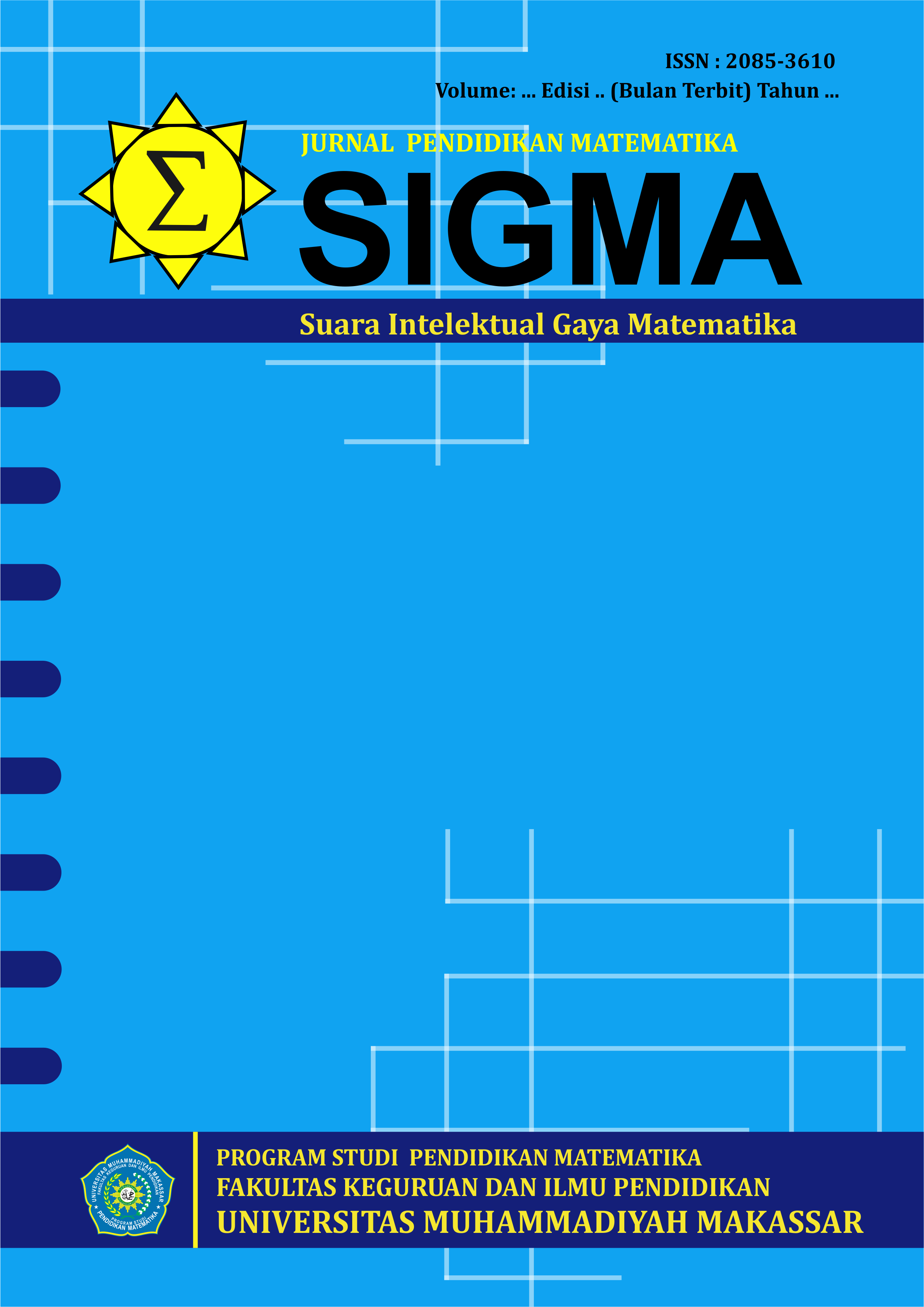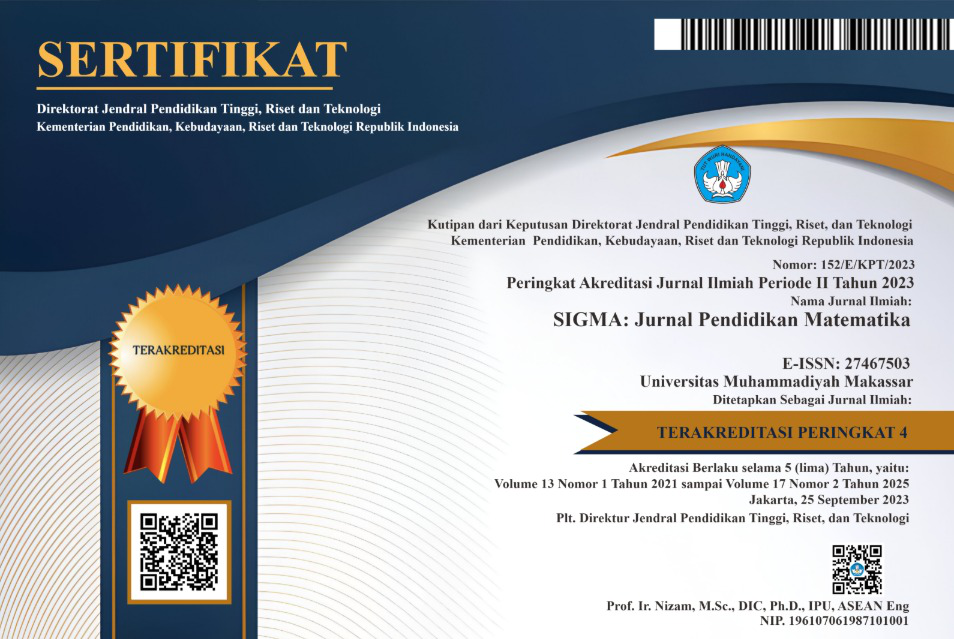ANALISIS KEMAMPUAN PEMECAHAN MASALAH MATEMATIS DAN SELF-EFFICACY SISWA PADA MATERI SPLDV
DOI:
https://doi.org/10.26618/sigma.v14i2.7587Keywords:
Mathematical Problem-Solving Skills, Self-Efficacy, Two-Variable Linear Equation System, Qualitative ResearchAbstract
In general, students’ problem solving skills tend to be in a low category, this is shown by the number of students who have not been able to complete diagnostic tests given in the form of routine and non-routine problems. One of the factors that affect students’ mathematical problem-solving skills is self-efficacy. This study aims to find out students’ mathematical problem-solving and self-efficacy skills in the material of a two-variable linar equation system. The type of research used in this study is qualitative research. The research method used is a descriptive analysis method. The subjects in this study were grade VIII students of the 2020/2021 school year who were in Pakuwon Subdistrict, Garut Subdistrict, Garut Regency which numbered 6 students. The sampling technique in this study is a purposive sampling technique. The data collection techniques used are mathematical problem-solving skills tests, self-efficacy questionnaires, interviews, and field records. The data analysis techniques in this study are data reduction, data presentation, and conclusion drawing. The results showed that students’ problem-solving skills were at 75% with the high category and student self-efficacy was at 68% with the good category.References
Andira, A., & Syam, H. (2022). Exploring of Students' Ability to Solve Geometry Problems Based on Van Hiele's Level of Thinking. ETDC: Indonesian Journal of Research and Educational Review, 1(2), 192-200.
Cahyani, H., & Setyawati, R. W. (2016). Pentingnya Peningkatan Kemampuan Pemecahan Masalah melalui PBL untuk Mempersiapkan Generasi Unggul Menghadapi MEA. 151–160.
Carrillo-Yañez, J., Climent, N., Montes, M., Contreras, L. C., Flores-Medrano, E., Escudero-Ávila, D., ... & Muñoz-Catalán, M. C. (2018). The mathematics teacher’s specialised knowledge (MTSK) model. Research in Mathematics Education, 20(3), 236-253.
Dewi, M. W. K., & Nuraeni, R. (2022). Kemampuan Komunikasi Matematis Siswa SMP ditinjau dari Self-Efficacy pada Materi Perbandingan di Desa Karangpawitan. Plusminus: Jurnal Pendidikan Matematika, 2(1), 151-164.
Fitriatien, S. R., & Mutianingsih, N. (2020). Peningkatan Kemampuan Belajar Mandiri pada Mata Kuliah Operasional Riset melalui Self Regulated Learning. Mosharafa: Jurnal Pendidikan Matematika, 9(1), 95-106.
Gillis, A., & Krull, L. M. (2020). COVID-19 Remote Learning Transition in Spring 2020: Class Structures, Student Perceptions, and Inequality in College Courses. Teaching Sociology, 48(4), 283-299.
Hadi, S., & Novaliyosi. (2019). TIMSS Indonesia (Trends in International Mathematics and Science Study). Prosiding Seminar Nasional & Call for Papers, 562–569.
Indriana, L., & Maryati, I. (2021). Kemampuan Pemecahan Masalah Matematis Siswa SMP pada Materi Segiempat dan Segitiga di Kampung Sukagalih. Plusminus: Jurnal Pendidikan Matematika, 1(3), 541-552.
Ismawati, Y. (2016). Analisis kemampuan pemecahan masalah spldv siswa berkemampuan tinggi di kelas viii smp kristen satya wacana berdasarkan tahapan polya ditinjau dari tingkat kesukaran soal.
Junika, N., Izzati, N., & Tambunan, L. R. (2020). Pengembangan Soal Statistika Model PISA untuk Melatih Kemampuan Literasi Statistika Siswa. Mosharafa: Jurnal Pendidikan Matematika, 9(3), 499-510.
Kirn, A., & Benson, L. (2018). Engineering students' perceptions of problem solving and their future. Journal of engineering education, 107(1), 87-112.
Kusumawati, E., & Irwanto, R. A. (2016). Penerapan Metode Pembelajaran Drill untuk Meningkatkan Kemampuan Pemecahan Masalah Matematis Siswa Kelas VIII SMP. EDU-MAT: Jurnal Pendidikan Matematika, 4(1), 49–57. https://doi.org/10.20527/edumat.v4i1.2289
Lestari, A. B., & Afriansyah, E. A. (2021). Kemampuan Pemecahan Masalah Matematis Siswa Smp Di Kampung Cibogo Pada Materi SPLDV. SIGMA: Jurnal Pendidikan Matematika, 13(2), 92-102.
Lusiana, L., Armiati, A., & Yerizon, Y. (2022). Kemandirian Belajar dan Persepsi Siswa Mengenai Guru Terhadap Kemampuan Pemecahan Masalah Matematis Siswa SMK. Mosharafa: Jurnal Pendidikan Matematika, 11(1), 155-166.
Manullang, M. (2014). Manajemen Pembelajaran Matematika. Jurnal Pendidikan Dan Pembelajaran Universitas Negeri Malang, 21(2), 208–214. http://journal.um.ac.id/index.php/pendidikan-dan-pembelajaran/article/view/7532/3445
Mundiri, A. (2016). Strategi Lembaga Pendidikan Islam Dalam Membangun Branding Image. Pedagogik; Jurnal Pendidikan, 3(2), 58–72.
Murniati, S., Roza, Y., & Maimunah, M. (2021). Analisis Kesesuaian Materi Himpunan Buku Teks Siswa Matematika Kelas VII terhadap Kurikulum 2013. Mosharafa: Jurnal Pendidikan Matematika, 10(2), 177-188.
Novferma, N. (2016). Analisis Kesulitan Dan Self-Efficacy Siswa SMP Dalam Pemecahan Masalah Matematika Berbentuk Soal Cerita. Jurnal Riset Pendidikan Matematika, 3(1), 76–87. https://doi.org/10.21831/jrpm.v3i1.10403
Prabawa, E. A. (2017). Analisis Kemampuan Pemecahan Masalah Ditinjau Dari Gaya Kognitif Siswa pada Model Project Based Learning Bernuansa Etnomatematika. Unnes Journal of Mathematics Education Research, 6(1), 120–129.
Prajono, R., Gunarti, D. Y., & Anggo, M. (2022). Analisis Kemampuan Berpikir Kritis Matematis Peserta Didik SMP Ditinjau dari Self Efficacy. Mosharafa: Jurnal Pendidikan Matematika, 11(1), 143-154.
Purnomo, B. W., & Sari, A. F. (2021). Literasi Matematika Siswa IPS dalam Menyelesaikan Soal PISA Konteks Saintifik. Mosharafa: Jurnal Pendidikan Matematika, 10(3), 357-368.
Rapsanjani, D. M., & Sritresna, T. (2021). Kemampuan Komunikasi Matematis Ditinjau dari Self-Efficacy Siswa. Plusminus: Jurnal Pendidikan Matematika, 1(3), 481-492.
Rahman, A. A., & Nasryah, C. E. (2020). Efektivitas Model Pembelajaran Missouri Mathematics Project untuk Meningkatkan Hasil Belajar Siswa SMA. Mosharafa: Jurnal Pendidikan Matematika, 9(2), 335-346.
Reiss, K., & Obersteiner, A. (2019). Competence models as a basis for defining, understanding, and diagnosing students’ mathematical competences. In International handbook of mathematical learning difficulties (pp. 43-56). Springer, Cham.
Robinson, B. (2018). Support for student learning. In Distance teaching for higher and adult education (pp. 141-161). Routledge.
Sari, L. K., & Madio, S. S. (2021). Kesulitan Belajar Matematika Siswa melalui Pembelajaran Jarak Jauh. Plusminus: Jurnal Pendidikan Matematika, 1(3), 409-420.
Shaturaev, J. (2021). Indigent Condition In Education And Low Academic Outcomes In Public Education System Of Indonesia And Uzbekistan. Архив научных исследований, 1(1).
Simamora, R. E., & Saragih, S. (2019). Improving Students' Mathematical Problem Solving Ability and Self-Efficacy through Guided Discovery Learning in Local Culture Context. International Electronic Journal of Mathematics Education, 14(1), 61-72.
Sopian, Y. A., & Afriansyah, E. A. (2017). Kemampuan Proses Pemecahan Masalah Matematis Siswa melalui Model Pembelajaran Creative Problem Solving dan Resource Based Learning (Studi Eksperimen pada Siswa Kelas X SMK Krija Bhakti Utama Limbangan). Jurnal Elemen, 3(1), 97-107.
Subaidi, A. (2016). Self-efficacy siswa dalam pemecahan masalah matematika. ∑IGMA, 1(2), 64–68.
Sumartini, T. S. (2020). Self Efficacy Calon Guru Matematika. Mosharafa: Jurnal Pendidikan Matematika, 9(3), 419-428.
van der Berg, S., & Gustafsson, M. (2019). Educational outcomes in post-apartheid South Africa: Signs of progress despite great inequality. In South African schooling: The enigma of inequality (pp. 25-45). Springer, Cham.
Downloads
Published
Issue
Section
License
With the receipt of the article by the SIGMA: Jurnal Pendidikan Matematika Editorial Board and the decision to be published, then the copyright regarding the article will be diverted to SIGMA: Jurnal Pendidikan Matematika.
Universitas Muhammadiyah Makassar as the publisher of SIGMA: Jurnal Pendidikan Matematika hold the copyright regarding all the published articles in this journal.Universitas Muhammadiyah Makassar has the right to multiply and distribute the article and every author is not allowed to publish the same article that was published in this journal.
The manuscript authentic and copyright statement submission can be downloaded ON THIS FORM.






